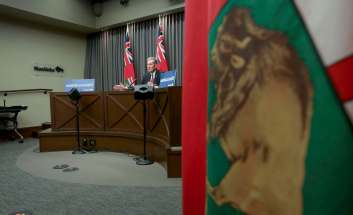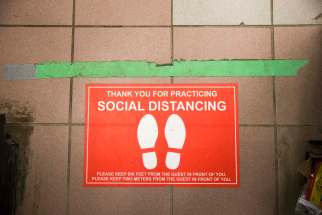Chequing in on Canadian political opportunism
Read this article for free:
or
Already have an account? Log in here »
To continue reading, please subscribe:
Monthly Digital Subscription
$0 for the first 4 weeks*
- Enjoy unlimited reading on winnipegfreepress.com
- Read the E-Edition, our digital replica newspaper
- Access News Break, our award-winning app
- Play interactive puzzles
*No charge for 4 weeks then price increases to the regular rate of $19.95 plus GST every four weeks. Offer available to new and qualified returning subscribers only. Cancel any time.
Monthly Digital Subscription
$4.99/week*
- Enjoy unlimited reading on winnipegfreepress.com
- Read the E-Edition, our digital replica newspaper
- Access News Break, our award-winning app
- Play interactive puzzles
*Billed as $19.95 plus GST every four weeks. Cancel any time.
To continue reading, please subscribe:
Add Free Press access to your Brandon Sun subscription for only an additional
$1 for the first 4 weeks*
*Your next subscription payment will increase by $1.00 and you will be charged $16.99 plus GST for four weeks. After four weeks, your payment will increase to $23.99 plus GST every four weeks.
Read unlimited articles for free today:
or
Already have an account? Log in here »
Hey there, time traveller!
This article was published 13/05/2020 (2066 days ago), so information in it may no longer be current.
As politicians dole out billions of tax dollars to prop up a COVID-19-ravaged economy, an overarching economic principle should be followed: relief should be based on need.
Unfortunately, that hasn’t always been the case — especially when it comes to payout schemes for seniors.
Imperfect as many government aid packages have been since the beginning of the novel coronavirus pandemic, most are aimed at getting dollars into the hands of the unemployed or the near-bankrupt.
The Canada Emergency Response Benefit, for example, was rushed out the door and into the bank accounts of anyone claiming to be out of work because of the pandemic.
Some may be receiving more from the taxable benefit than they earned prior to the pandemic; others, who are not qualified for it (but are receiving it anyway) will be audited and dealt with later. The economic benefits of getting cash into the hands of those in need as quickly as possible outweighed the shortcomings expected in any hastily crafted plan.
Most aid packages for businesses were also based on need, including the federal wage subsidy plan and a commercial rent relief program. Companies have to demonstrate significant revenue declines to qualify.
Not so for provincial and federal cheques handed out to seniors.
The Manitoba government led by Tory Premier Brian Pallister was first out the gate, pledging a one-time, $200 tax-free payment to anyone aged 65 or older, regardless of income. While many low-income seniors are struggling, a large portion of higher-income recipients are not.
This was clearly a political, not an economically strategic, move. Pallister is using the pandemic to drum up political support among seniors. If he wasn’t, he would have made it an income-tested program.
The payouts will cost $45 million, which makes a mockery of Pallister’s claim he’s controlling spending during the pandemic to limit the province’s borrowing requirements.
Prime Minister Justin Trudeau’s chicken-in-every-pot scheme for seniors announced this week isn’t much better.
The federal government’s program has two parts: everyone who collects an Old Age Security cheque will get $300, tax-free. Low-income seniors who receive a Guaranteed Income Supplement are eligible for an additional $200.
There’s a smidgen of income-testing: the $200 will only go to seniors who are very low income. It may help them pay for pandemic-related costs, such as higher dispensing fees for prescription drugs; however, when it comes to the six million people who receive OAS, many of whom are high-income, Trudeau is just as guilty as Pallister of trying to curry favour.
Clawbacks for OAS don’t start until annual income reaches $75,910; they’re fully repayable at $123,386.
Trudeau could have directed support solely to low-income seniors; instead, he attempted to use tax dollars to score political points with elderly voters.
This is the danger when governments are granted broad public support to open the purse strings during a crisis such as the COVID-19 pandemic. The privilege can be abused.
Handing out cheques to high-income seniors is a violation of that public trust. It’s not only a misuse of tax dollars, it takes resources away from areas of genuine need.
Ottawa is spending an estimated $2.5 billion on payments to seniors. At the same time, thousands of businesses forced to shutter during the pandemic can’t access a commercial rent assistance program because of a flawed design. Ottawa refuses to support commercial renters directly (where landlords decline to participate in the program), but it has cheques for seniors with annual incomes of $100,000.
No one is expecting perfection, especially when it comes to designing multibillion-dollar aid packages in a few short weeks (programs that normally take months, if not years, to develop). Mistakes will be made. Some will fall through the cracks.
The public will likely accept those shortcomings to ensure Canada has an economy to return to when the pandemic ends.
What it may not tolerate is the kind of crass political opportunism of cheques-to-seniors programs.
tom.brodbeck@freepress.mb.ca

Tom Brodbeck is an award-winning author and columnist with over 30 years experience in print media. He joined the Free Press in 2019. Born and raised in Montreal, Tom graduated from the University of Manitoba in 1993 with a Bachelor of Arts degree in economics and commerce. Read more about Tom.
Tom provides commentary and analysis on political and related issues at the municipal, provincial and federal level. His columns are built on research and coverage of local events. The Free Press’s editing team reviews Tom’s columns before they are posted online or published in print – part of the Free Press’s tradition, since 1872, of producing reliable independent journalism. Read more about Free Press’s history and mandate, and learn how our newsroom operates.
Our newsroom depends on a growing audience of readers to power our journalism. If you are not a paid reader, please consider becoming a subscriber.
Our newsroom depends on its audience of readers to power our journalism. Thank you for your support.






